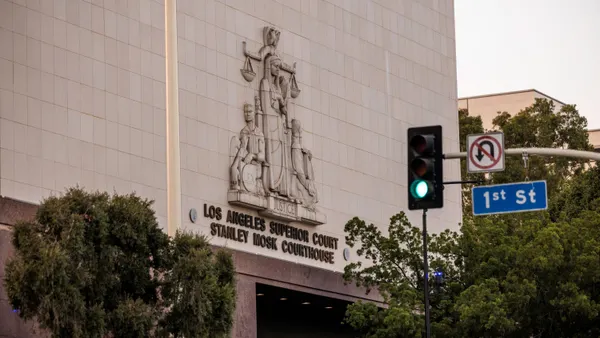Dive Brief:
- Indiana Attorney General Todd Rokita alleges Indianapolis Public Schools has multiple policies that violate state laws by prohibiting local government entities from limiting or restricting federal immigration enforcement.
- In a lawsuit filed Thursday, Rokita claims the 30,000-student district has policies barring federal immigration officers from accessing nonpublic areas on school property without a judicial warrant, and that these policies are illegal under Indiana law and pose “grave risks to public safety.”
- Rokita’s lawsuit also cited an incident on Jan. 8, 2025, in which IPS’ policies “directly contributed to the failure” of federal immigration officers attempting to deport an undocumented Honduran man.
Dive Insight:
The IPS Board of School Commissioners said in a Thursday statement that Rokita’s lawsuit is a “heavy burden” and “silly litigation and political posturing” that impacts students, families and taxpayers.
“Every dollar spent on defensive legal posture is a dollar not spent on instructional support, teacher development, student services, or enrichment,” the board said. “In this case, Mr. Rokita prefers those dollars go to fight gratuitous political battles, as has too often been the case.”
The board emphasized that it has always upheld the law and will continue to do so while ensuring “safe, supportive, and welcoming learning environments for all students.”
Beyond denying access to immigration enforcement officers to school property without a judicial warrant, IPS also requires its employees to not assist immigration efforts unless legally required and authorized by the superintendent, according to Rokita’s lawsuit. The other IPS policy challenged in the complaint is that district staff are prohibited from collecting, maintaining or sharing information about the immigration status of a student, their parents or a school employee.
The IPS Board of School Commissioners said it has been “actively collaborating” with Rokita’s office to go over relevant policies of concern. The board said, however, that Rokita only gave the district five business days to review and respond to his opinion on the policies.
“Yet, these important issues deserve thoughtful, deliberative weighing of important legal rights — not impulsive, superficial efforts for political gain,” the board said.
The IPS policies being challenged, however, are a common practice in other school districts looking to protect students affected by the Trump administration’s crackdown on immigration enforcement in communities nationwide this year.
In fact, immigration lawyers have advised districts across the country to train their principals and teachers to know that Immigration and Customs Enforcement officers cannot enter school property without a warrant signed by a judge.
Immigration advocates have also pointed to the U.S. Supreme Court’s 1982 decision in Plyler v. Doe, which ruled that states cannot constitutionally deny students a free public education based on their immigration status. Additionally, other state and local guidance has reminded school administrators this year that districts must maintain the confidentiality of all personally identifiable information in education records related to students under the Family Educational Rights and Privacy Act.
As ICE efforts go on near school communities, some district leaders — most recently at Chicago Public Schools — are calling for virtual schooling for students and families living in fear of federal immigration enforcement presence. Educators, advocates and child psychology experts are continuing to sound the alarm on the traumatic impacts immigration enforcement has on students, including school avoidance and stress.
But in Indiana, Attorney General Rokita said in a Thursday statement that sanctuary policies like those in place at IPS “are bad in any context, but they are especially troubling in our schools.” He added that, “schools across the country are vulnerable to infiltration by criminal illegal aliens — it's happened in many other states — and it is essential that ICE be able to take action when that occurs to help keep our kids safe.”
Rokita’s lawsuit also alleged that in January, ICE’s efforts to deport an undocumented Honduran man living in Indiana were thwarted because IPS did not let the man’s son, who is an IPS student, reunite and leave the U.S. on a flight with his father, who volunteered to board.
“IPS took the position that it would not release the child to an ICE officer unless the officer had a judicial warrant or other court order,” the lawsuit said. “ICE responded that it simply was asking that the son be released to the father so that they could depart the country as the father had agreed to do and that such action did not require a court order.”
Because the father was unable to get custody of his son to board the flight with him, the father missed his flight, and the voluntary departure order expired, according to the complaint. As a result, the lawsuit said that “an illegal alien who should have departed the United States — who had voluntarily agreed to depart the United States — therefore remained in the United States because of IPS’s actions.”












